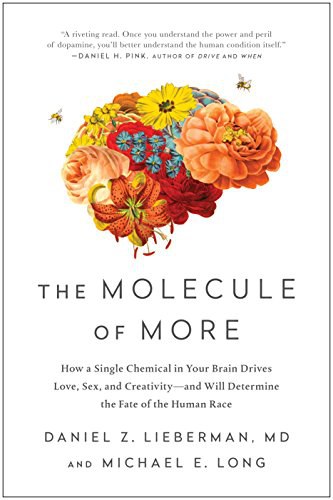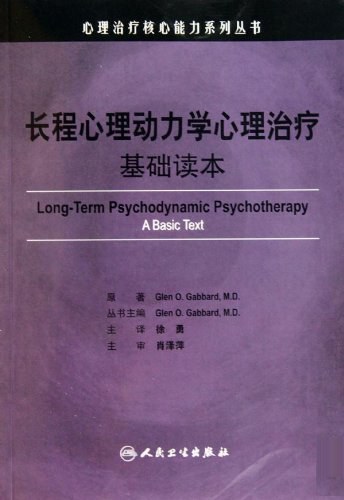
TheMoleculeofMore
[ 心理学 ]推荐者:百科书库 2023-04-11 15:42:36
本书简介
- 作者:DanielZ.Lieberman/MichaelE.Long
- 出版社:BenBellaBooks
- 副标题:HowaSingleChemicalinYourBrainDrivesLove,Sex,andCreativity―andWillDeterminetheFateoftheHumanRace
- 出版年:2018-8-30
- 页数:240
- 定价:GBP19.99
- 装帧:Hardcover
Possible rephrased and formatted text:
Why do we crave things only to feel bored after getting them? Why does addiction make sense to addicts? Why does love often shift from passion to indifference? Why do some people strongly identify with liberalism while others with conservatism? And why do we remain hopeful even in dire situations and find solutions? The answer to these questions lies in a single brain chemical: dopamine.
Dopamine ensured early humans' survival and now underlies our most basic behaviors and cultural norms, driving progress. It's the chemical of desire that always wants more stimulation and rewards, unfazed by emotions, fears, or moral concerns. That's why an ambitious person sacrifices everything for success, or a satisfied spouse risks everything for a new thrill. Dopamine explains why we seek and succeed, discover and prosper, but also why we gamble and squander.
Dopamine doesn't care for possessing something but getting something new. By understanding the difference between having and anticipating something, we can unravel many seemingly unrelated behaviors in love, business, addiction, politics, religion, and predict them in ourselves and others.
In their book "The Molecule of More: How a Single Chemical in Your Brain Drives Love, Sex, and Creativity – and Will Determine the Fate of the Human Race," psychiatrist Daniel Z. Lieberman, MD, and lecturer Michael E. Long propose a radical perspective: Many aspects of human life have an overlooked component that sheds light on behaviors such as cheating, mental illness in geniuses, failed diets, and diverging political beliefs.
作者简介
DanielZ.Lieberman,M.D.isprofessorandvicechairforclinicalaffairsintheDepartmentofPsychiatryandBehavioralSciencesatGeorgeWashingtonUniversity.Dr.LiebermanisaDistinguishedFellowoftheAmericanPsychiatricAssociation,arecipientoftheCaronFoundationResearchAward,andhehaspublishedover50scientificreportsonbehavioralscience.Hehasprovi...
相关推荐
长程心理动力学心理治疗
全书涵盖以下几个方面:病人处理、相关医学知识、医患沟通和专业化精神。此外,书中还提供了实践标准和用于评估临床能力的方法。本书适合专业从事医学心理学、心理治疗和精神科医学的人员。 GlenO.Gabbard(甘伯德) 2023-05-13 14:17:43为什么精英都是动机控
精英都是动机控!掌握支配心理动机运转的法则,就掌握了驱使别人或自己做事的关键。精英之所以在职场游刃有余,是因为他们掌握了“动机”这个强有力的武器。日本潜能训练大师池田贵将精选斯坦福大学、哈佛大学、哥伦 [日]池田贵将 2023-04-11 14:07:11拉康精神分析介绍性辞典
-编辑推荐-●中国人民大学吴琼教授、拉康派精神分析师潘恒博士作序推荐○出版近三十年来,最具经典性和实用性的拉康精神分析辞典●理论研究者和精神分析家案头必备工具书○熟识拉康复杂、晦涩术语,推开拉康精神分 [英]迪伦·埃文斯 2023-05-13 14:19:38解放你的大脑
我们的大脑潜能非常巨大。据研究,有些天才能够在4秒内计算出一个百位以上数字的13次方根。实际上,我们每个人都有这样的能力,但通常使用的方式就如同只用小拇指提重物,没有充分发挥整个手掌的能力。在本书中, [法]伊德里斯·阿贝尔坎 2023-04-11 14:08:14大师的手艺与绝活
《大师的手艺与绝活(米纽秦家庭治疗精髓)》由作者萨尔瓦多·米纽秦、迈克尔·D·雷特、夏尔曼·博尔达以及家庭治疗的受训者们共同撰写。本书总结了一些基本规则,旨在帮助受训者从理论进入实践。本书分为两部分, 米纽秦,迈克尔·D.雷特 2023-05-13 14:20:33先学会爱自己,再遇见对的你
编辑推荐:★幸福心理学关系教练、女性自爱力探索者周梵2019年重磅新作!只有爱上真实的自己,他才会好好来爱你!★周梵老师将自己十四年爱情、婚姻经历,再加上千个来访者真实咨询案例,打造千万都市男女都需要 周梵 2023-04-11 14:12:01創傷的內在世界
本書以榮格觀點探討創傷治療,是最重要的著作之一。透過翻轉心理界對創傷治療的觀點,本書指出解離和逃避的機制也具有保護作用。卡爾謝博士出身榮格學派,以原型理論為核心,整合泛精神分析中的創傷理論、客體關係以 [美]唐納•卡爾謝(DonaldKalsched) 2023-04-11 14:13:26© 2023-2025 百科书库. All Rights Reserved.












发表评价